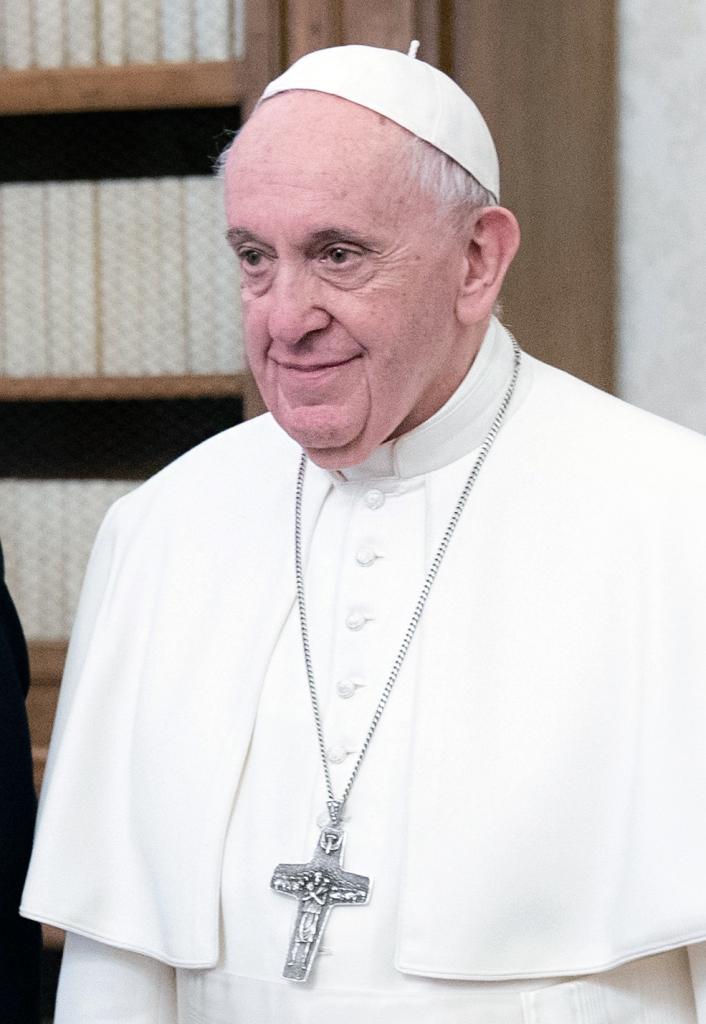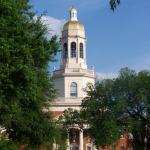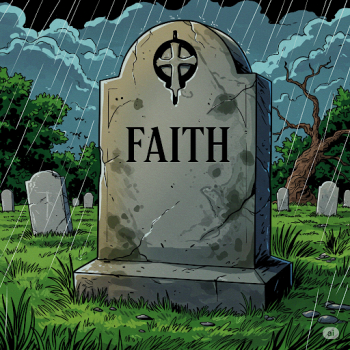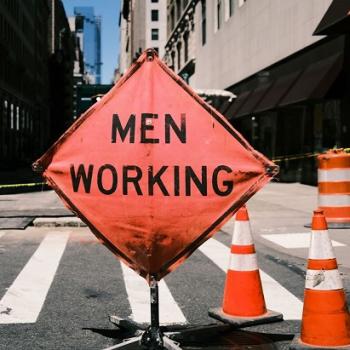Pope Francis has recently issued statements about the Ukraine war that are so mind-bogglingly at variance with reality as to raise alarming questions about him, and by extension, about anything in his record in that office. Why, in short, is he repeatedly recycling Kremlin talking points? I do have a couple of theories to explain his behavior, but none is too complimentary.
Francis has in the past said some extremely silly things about the war currently raging in Ukraine. Last June, he made a statement that attracted nothing like the attention it should have done internationally. In an interview with La Civiltà Cattolica, he condemned Russian atrocities, but also made it clear that the situation was not black and white. The words must be quoted at length, because they are so hard to credit:
“We need to move away from the usual Little Red Riding Hood pattern, in that Little Red Riding Hood was good and the wolf was the bad one,” he said. “Something global is emerging and the elements are very much entwined.” Francis added that a couple of months before the war he met a head of state, who he did not identify but described as “a wise man who speaks little, a very wise man indeed … He told me that he was very worried about how NATO was moving. I asked him why, and he replied: ‘They are barking at the gates of Russia. They don’t understand that the Russians are imperial and can’t have any foreign power getting close to them.’” He added: “We do not see the whole drama unfolding behind this war, which was, perhaps, somehow either provoked or not prevented.”
The “NATO barking at Russia’s doors” idea had also surfaced in a separate interview in May, so it appears to have struck Francis deeply.
Where on earth to start with this farrago? Provoked, eh? There is no way to read that except in terms of the standard and very often-cited Kremlin propaganda view of evil Ukrainian conspiracies – you know, all those secret biological warfare plants, and so on. Not to mention claims about Ukraine being the world’s first ever Nazi state headed by a little Jewish guy. Sounds like The Great Dictator, does it not? Charlie Chaplin, thou shouldst be living at this hour, Ukraine hath need of thee.
As for the head of state he quotes, I don’t know who that was, but we could probably work it out. Whoever it was, the language is pure Kremlin-speak, and the underlying mind-set is, well, barking.
Francis’s most recent contribution to human wisdom is no less toxic. He issued a statement urging the need for peace in that conflict, which no sane person would dispute, but made it clear that negotiations must begin now, and that Ukraine’s leaders must “make far-sighted decisions for peace.” All commentators read that in the only way it could be understood, which is that Ukraine must be willing to make concessions, to grit its collective teeth and accept grim reality, in the cause of peace. In practice, that would mean legitimizing existing Russian conquests, certainly in Crimea, and perhaps granting more – how about Odessa, gift-wrapped? But think it through. The consequence of such a settlement on Russian terms would be an untenable Ukrainian rump state which would sooner or later fall into Russian hands. Having won that signal victory, Putin or his successors – Ramzan Kadyrov? – would be nicely prepared for a next move, which would be into the Baltic countries, and NATO’s eastern members.
My interpretation of that statement and its consequences does not represent some warped kind of paranoid prophecy. This is obvious to anyone who has the slightest awareness of the situation, and it is certainly apparent to the very skilled foreign policy experts of the Vatican. So here is my dilemma. Is Francis spouting this pernicious nonsense of this own, perhaps reflecting the phantasmagoric conspiracy culture that was such a part of the Argentina in which he grew up? After all, the Peronism that dominated the country during his early life preached a Third Way that was as much opposed to the West as to the Soviets. Or is Francis in the hands of some close Vatican adviser, who is a Russian tool? Or what on earth is happening?
One critical dimension involves the Vatican’s relationship with the turbulent world of Italian politics, where pro-Russian views are notoriously common among the Right-wing parties that have scored major advances in recent years, and who scored so big in this Fall’s election. Several such groupings have been accused of receiving Russian funding for years, just like the Italian Communist Party unquestionably did in its day. Prime Minister Giorgia Meloni is strongly pro-Ukraine in her public statements, but she has to perform a delicate dance to maintain the loyalty of her own party, the Fratelli d’Italia, where pro-Russian views are often heard. Another Rightist leader is Silvio Berlusconi, of Forza Italia, who has been recorded declaring that Ukraine “provoked” the invasion: hmm, where have we heard that word before? Berlusconi communicates easily with Putin, his good friend: both men speak fluent Oligarch.
On the other side of the equation, the Vatican is still struggling to find secular allies that would replace the Christian Democrats on whom they relied for so many decades. Perhaps showing some neutrality on Ukraine is a way of achieving this, and of making nice to the newly ascendant Far Right. In practical terms, that means the Vatican adopting the thought world of the post-Fascist Italian Right, and appropriating its rhetoric, which in the contemporary context means speaking up for Putin’s foreign policy. But if that context explains why Francis is now speaking out on behalf of evil militarism, in no sense does it justify it.
The Kremlin has happily accepted the Vatican offer to mediate, but those nasty warlike Ukrainians have refused. They would be idiots to make any other decision.
I totally understand the diplomatic tradition of avoiding too overt condemnations of one side, which could make mediation difficult, and Francis has reasonably defended his record of not publicly identifying Putin as the aggressor. The Wall Street Journal just did an informative and balanced piece on this matter. But even there, we rapidly get into odd territory. The Pope seems to say that those who have committed the worst atrocities are not actually Russian, but rather “are not of the Russian tradition, such as the Chechens, the Buryati and so on.” Put another way, they are not good White Christian Slavs, they are just Muslims and Siberian Buddhists. Doesn’t this raise all sorts of issues of ethnic, religious, and racial prejudice? I was amused to see that the Russians – the Russians! – denounced that interview as racist, and as the acknowledged world leaders in racism, they would know.
But assume Francis is right. Exactly whose orders have sent all those Chechens, Buryats, and so on into Ukraine? That commander would be the President, Putin, who is terminally Russian and ostentatiously Orthodox, as are the key generals. If an army recruits and mobilizes violent ex-cons and criminals, as the Russians are doing, we don’t wholly blame the criminals for the atrocities they commit against civilians: we blame the vicious savages who sent them into action in the first place. The Pope’s words get more baffling by the day.
Francis’s recent Ukraine statements actually include multiple gems on such matters, which might not be obvious at first because of the general fog of pious rhetoric that surrounds them. Try this one:
We must all be pacifists, wanting peace, not just a truce that maybe only serves to rearm, but a true peace, which is the fruit of dialogue. Peace is not achieved with weapons, because they don’t defeat hatred and the thirst for domination, which will re-emerge, perhaps in other ways.
To which an obvious parallel suggests itself. If we were back in 1942, presumably Francis would be declaring that weapons alone are not going to defeat the Nazis, because their regime could never really be destroyed by such means. Far better to start a dialogue that would bring peace, and Britain, France, and Poland should be “far-sighted” about offering the Germans sufficient concessions to bring them to a true peace. After all, what would be the point of crushing Hitler? Nazi Germany would be back in a few years. Negotiations are always the best course, and especially when the aggressor holds all the cards. Anyway, the Poles probably provoked the whole thing …
I’m sorry, does that all sound off-the-charts ludicrous? Why yes, it does. Rather like what Francis is saying in 2022.
Obituaries, famously, offer the three kinds of wash: eye-, white-, and hog-. When in due course we do eventually get to write Francis’s obituaries, these present affairs and pronouncements should not be forgotten, or whitewashed. They surely invalidate most of the positive contributions that he might conceivably have made in other areas.
Can someone save Francis from himself?

















